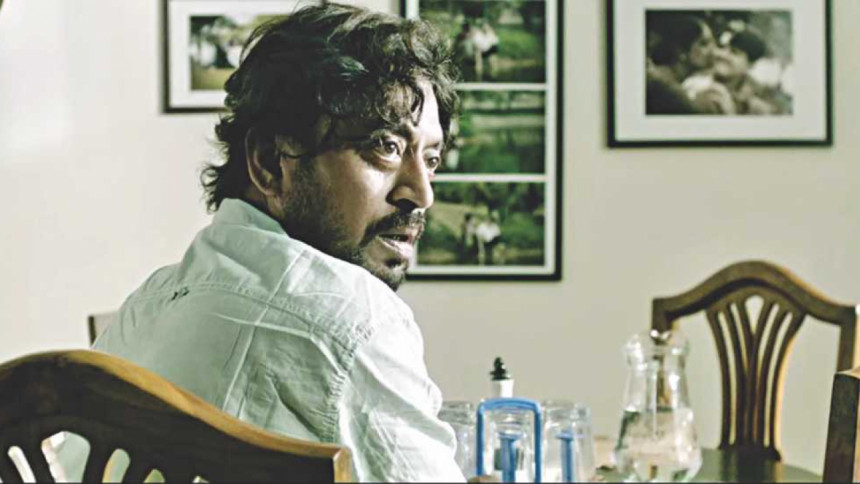Film Review: Doob

The extent of how hotly-anticipated Mostofa Sarwar Farooki's “Doob” is became clear on Thursday afternoon when I had to resort to pulling some strings to secure a first day first show ticket for it. For all his international acclaim, Farooki's films typically have not caused a ticket crisis, and that this film was at the centre of such whirlwind anticipation owes largely to what transpired with it before release. There was considerable buzz when it was announced in March last year that Irrfan Khan, one of the most high-profile actors of the sub-continent was not only starring in the Bangladesh-India joint production, but also co-producing it. But an explosive report in a newspaper in Kolkata in November that the film was based on the life of the late Humayun Ahmed, the most iconic novelist of contemporary Bangladeshi literature, did things heat up. Despite Farooki clearly stating that it is not a biopic, the film's no-objection certificate by a government committee was revoked a day after issuing it in February, and by the time it got censor clearance back at home the film had already gained some momentum in the international film festival circuit. Quite a few festivals, an award and some rave reviews later the film finally opened yesterday in theatres in the country, as well as in India and Australia.
One of the biggest challenges for a filmmaker (or any storyteller) is to make a fictional story convincing to the audience, and Farooki rather willingly takes the double-edged sword of crafting a story out of incidents that hit close to the late wordsmith's controversial later life, that is not only believable, but all-too-familiar. As I sat in the theatre I heard mumbles from around me drawing direct parallels of the on-screen happenings to real-life events. So, to answer the question: is “Doob” Humayun Ahmed's story? No. But is it closely inspired by it? Quite safe to say that it is.
The film is as advertised: A touching separation drama with love, loss and family at its core. The events that happen in the film line up to Humayun Ahmed's life, but this film is not about the events; it is about the feelings, emotions and the reaction of the characters in it and that is where “Doob” excels. Despite Irrfan Khan (playing filmmaker Javed Hasan) being the epicenter of the film, for me it is Nusrat Imrose Tisha (as his daughter Saberi) who steals the show. Her portrayal of pain, conflict, weakness and strength are incredible, often without uttering a word. Irrfan delivers an impeccable performance as a flawed, tormented soul torn between family and newfound love, while Rokeya Prachi (as Javed's wife Maya) is also formidable in her stoic, reserved character. Nitu, Javed's muse and the catalyst in the family tearing apart is played by Parno Mittra with commitment and verve. Sheikh Rajibul Islam's cinematography is smart and constrained, with some typical 'Farooki' shots (like panned indoor and conversation shots instead of cuts, and out-of-frame dialogue) stamping the helmer's signature on it. The scores by Pavel Areen is also all kinds of amazing, and the lone song oozing melancholy (by Chirkutt) fits like a glove in the sequences it is used.
But is the film flawless? No. While the format of shooting it in 'chapters' instead of a chronological continuous events is essential for the story Farooki tried to tell, it runs the risk of losing the general audience a little. Some events serving as plot devices also seem a little rushed and not done with as much care as the ones where the characters are interacting in sincere personal moments (like when Javed calls up a newspaper editor, or in his and Nitu's TV appearance). While Javed's death calls back to his philosophy on death that he utters early on in the film, it is brought about without any explanation and it is a bit of a jerky transition in the narrative. Lastly on the list of things I didn't love is the young boy who plays Javed's son Ahir; a character somewhat wasted in poor acting and not having enough to do.
My biggest gripes with the film however are that neither Maya nor Nitu's characters are rounded enough for the central roles in such a limited-characters story. While the only sequence where Nitu and Javed spend some alone time is utterly brilliant in its subtlety and undertone impact, there is not nearly enough that substantiates Saberi's complaints against Nitu trying to replace her in Javed's life. We also never get to really know Maya as a person, and it leaves the audience hanging in the dark a little bit. What Farooki did with the characters played by Irrfan and Tisha are great, but whether that came at the cost of the other characters' development remains a nagging question at the back of my head. Also, Javed is termed a filmmaker the entire time but there is no real evidence of it; what is established through a newspaper report, a TV interview and some autograph seekers I feel could be helped a great deal even in a brief moment of him behind a movie camera.
Overall, Farooki's choice of subject material (or inspiration, however you see it) is bold, he sticks to his guns to deliver a sensitive story expertly delivered in understated expressions without pandering to the lowest denominator of the audience, and it makes for some classic cinematic moments. Personally, I did not see Humayun Ahmed on screen; I saw Javed Hasan's helplessness as he goes through his innermost struggles. That his life trajectory is reminiscent of Bangladesh's most-loved author occurred to me, but didn't bother me.


 For all latest news, follow The Daily Star's Google News channel.
For all latest news, follow The Daily Star's Google News channel. 



Comments